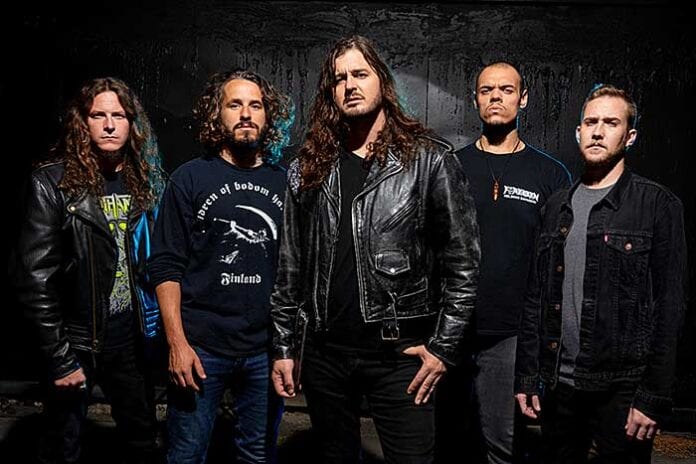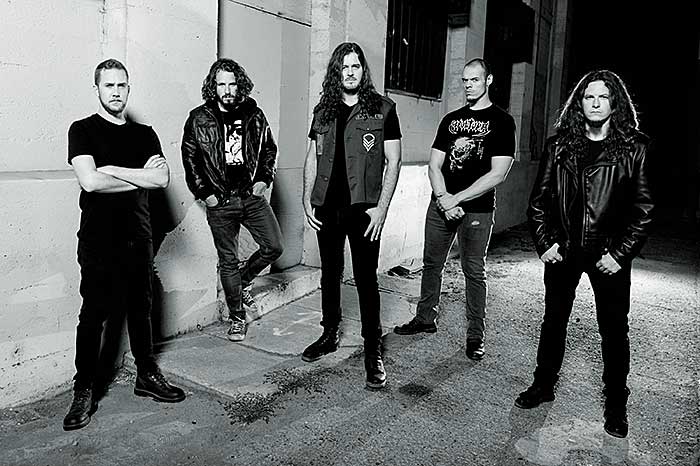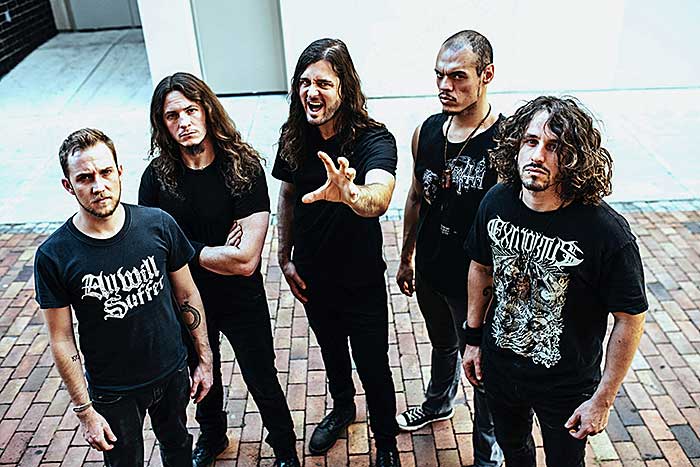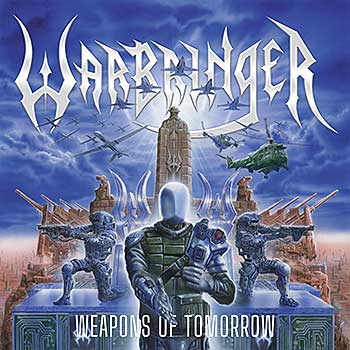
INTERVIEW WITH JOHN KEVILL BY KELLEY SIMMS
PHOTOGRAPHS BY ALEX SOLCA & DEIDRA KLING
Coming off the heels of its magnificent 2017 comeback album, Woe to the Vanquished, California thrashers Warbringer have upped the ante with its sixth full-length album Weapons of Tomorrow, released via Napalm Records.
After 2013’s underwhelming IV: Empires Collapse, Warbringer literally collapsed, leaving sole original member and vocalist John Kevill to rebuild the band. Now back stronger than before, Warbringer’s current lineup—also featuring guitarist Adam Carroll, drummer Carlos Cruz, guitarist Chase Becker, and bassist Chase Bryant—is as vicious and as focused as ever in 2020, even amidst the uncertainty of the Coronavirus pandemic.
During a recent phone call with Outburn, Kevill spoke about the band’s new album, the current social distancing situation, his ongoing pursuit in becoming a history professor, and Warbringer’s future plans.
During this self-quarantine due to Coronavirus, how are you channeling your creativity? What have you been up to?
Oh, not a lot! Besides the impending album release, I’m not in school right now. I’m not working. I’m mostly being a house husband to my wife. I’m learning to cook all this stuff. I’m doing a couple of hours of phone interviews every day. Thank god for that, or I wouldn’t have any actual job to do on most days. It’s been a little weird. We had gotten to the point where we had some decent savings and gotten into the stock market right before this, and you can imagine what happened to that. But fortunately, at least we’re not going under, and I don’t think we have to go into debt or anything. But it sucks what it’s doing to so many people, let alone to people who are sick and/or dying, which obviously that’s not good. There was a statistic before this that something like 40 to 50 percent of Americans could not handle an unexpected $400 expense. Well, then this happened. And I can imagine whoever was on that line is borrowing money and mortgaging their future right now to not go under. I think that this crisis is causing a mass loss of faith in the system. I get pissed about this stuff, that’s why I scream into a microphone and that’s why I write angry-ass songs.
“THIS CRISIS IS CAUSING A MASS LOSS OF FAITH IN THE SYSTEM. I GET PISSED ABOUT THIS STUFF, THAT’S WHY I SCREAM INTO A MICROPHONE”
Did you or your label, Napalm Records, ever discuss delaying the album’s release date?
We talked about it, but decided against it. The bands that are delaying album releases, as far as I understand, the real line there on who is and who isn’t going to do that, is was the record already manufactured? If it was, then they don’t have to delay the release. However, if it wasn’t already manufactured, the factories where they would manufacture the record are shut down, so they have to. We already announced the release date and we’re sticking to it. We already promised that to the fans. I’d imagine that people who are stuck inside worried about their health or their financial future or both, that these people could probably use a new record that they might enjoy listening to and not have a record that they were looking forward to delayed till after this is done. Everyone’s inside, so in a way it might not actually be a bad time to put out a record because people have nothing to do but listen to it right now. Hopefully, that works in our favor. Warbringer’s whole career has been an uphill battle, so I feel like Murphy’s Law has been my permanent enemy. It’s been one struggle after another. But I fundamentally love what we do, and I believe in it.

The band actually collapsed after the aptly titled IV: Empires Collapse. What led to the band going off the rails?
Well, it wasn’t the album. The album was a symptom of the band. It was due to the people and the life of the band. The story is Warbringer had been shot full of holes from the first three records because we toured relentlessly. In 2009 on Waking into Nightmares, we did 300 shows that year, and you know how many days there are in a year. That’s nuts! Nobody does that. So, that’s the story about why Warbringer has this really high turnover rate in people for the first several albums. We were trying to get our name out there and were grinding ourselves. By the third album, Worlds Torn Asunder, the cracks were showing.
“WE WERE SICK OF BEING COMPARED OR TREATED LIKE THIS JUNIOR 80S TRIBUTE BAND. WE NEVER WANTED TO BE A NOSTALGIA ACT, WE JUST LIKED METAL.”
John Laux, the original guitar player, and I were the main songwriting team early on for all the records. Around the third album, he’s sick of touring, the concerts and the metal scene, he wants to leave the band. So, Empires Collapse was written with a core member looking for the door. There are two reasons for this. One is we were sick of being compared or treated like this junior 80s tribute band. We never wanted to be a nostalgia act, we just liked metal. Secondly, John Laux was specifically moving out of metal and some of his tastes, and I wanted to keep him happy, so I let him do what he wanted songwriting wise. So, we have a couple of songs with a lot more hardcore type influences. And then on the other end, there are these songs with really proggy influences. So, it’s an all over the place record.
It’s not my favorite record that we made, but it’s a weird-ass record that you can’t compare it to any 80s thrash record. I’d say we couldn’t do the phase of the band we’re in now, in which between Empires and Vanquished, it’s a whole rebirth of the band. There was a period in time where the band didn’t exist, and I had to rebuild it and then re-rebuild it. So, there was a lot of work and downtime between then. But what we end up at though, on Woe to the Vanquished and Weapons of Tomorrow and some of the more adventurous, risk-taking songwriting on Empires Collapse, is we were able to take that more progressive influence. I think we cut down on the punk and hardcore influences because that was mostly John Laux’s thing. Nothing against it, but metal is where my heart is. I think if you go through our discography in sequence, you’ll see that we couldn’t get to where we have this wider scope of songwriting, without that transitional record.

How is the band camaraderie and musical chemistry these days?
It’s pretty good. Post-Woe to the Vanquished is Warbringer 2.0. Me, Carlos, and Adam wrote these last two records for the most part with the exception of the fine solos and basslines that Chase and Chase are putting down. It became really stable after that. The band is a weird thing. When we’re at home, we don’t really talk that much. I talk to Carlos pretty much entirely about business. Then on the road, we hang out all the time. In our regular life, we live in our separate worlds, and then we come back together like nobody ever left. It’s been really easy to maintain this lineup, and everybody pretty much knows that there’s a certain vibe that we have about where your performance and musicianship needs to be, what your attitude needs to be. We pretty much all heed to that. So, there’s very little conflict, nobody really argues with the fact that we want to be a serious and good band. Everyone’s on that page. In any group, if everyone has the same basic goal and interest, that makes it smooth. When they don’t have that, it’s going to be rocky.
In the past few years during your downtime from Warbringer, you’ve been attending college to become a history professor.
I still have one to two more degrees, depending on where I want to teach. I’d like to do college, because I’d like to teach history and not propaganda. I started that when the band started falling apart after the fourth album Empires Collapse, so about 2014. I went to community college for my associates degree and I went to the California State University Northridge for my bachelors, where I graduated pretty much before I recorded Weapons of Tomorrow. I’m doing this thing where I’m doing an album, then degree, then album, then degree. I imagine my masters will follow the tour and release cycle of Weapons of Tomorrow.
“EVERY MOMENT THAT WAS LIVED, PEOPLE EXPERIENCED IT WITH FULL EMOTION AND PASSION JUST LIKE YOU DO IN YOUR LIFE.”
Have you been able to use your degrees yet in front of a classroom?
During my last year of my bachelor studies, I got to do something cool, which is I actually got to teach a class at California State University where I got to go up there in front of the whole class for an hour and a half. I wasn’t even in the class. World War II, where I did the Battle of Stalingrad, that I wrote and designed, it went very well. It seems that I have a talent for this sort of stuff. I really enjoy talking about it and I enjoy being a performer and an entertainer, that’s what I do in this life. I want to create a style of teaching that’s not as dry, but really sucks you into the crazy human stories that happened. Whether we’re talking about grand expeditions or voyages or battles. Every moment that was lived, people experienced it with full emotion and passion just like you do in your life. And if you really think about that, that’s fucking crazy! If you actually think about yourself there, movies become lame because the writing here sucks, it’s all contrived. But real stories don’t have instantly built-in happy endings, people have to actually work it out for themselves. The stories are way better.
How do you go about putting your love of history into your lyrics?
I try to do it in a way that’s very captivating. If you’ll notice, you’ll never hear a date, a year or anything in a Warbringer song. I have a very certain theory of how I write this into music. I’m very big on you have to keep the song first. The lyrics have to serve the song, the song should not serve the lyric idea. What you’re trying to do, a lyrical idea that’s very specific and detailed, that becomes challenging. And that’s been something that I’ve been cracking at for a few albums now, is how to write lyrics about a certain event or a certain idea and still keep the universal enjoyability of music there. I’m interested in everything, but my focus in what I know the most about is geopolitics, warfare, and power. The story of humanity is like a jigsaw puzzle and like a jigsaw puzzle, the more pieces you have in the picture, the easier it is to slot in the next piece you draw to connect it to everything else in the time period in the greater story of time. One of the things that’s great about this is that it’s a vast collection of stories about humans, either on a larger or a small scale, and that gives you all sorts of shit to draw on for songs. I think it’s a real leg up as a lyricist to have year from year tons of new stuff all the time, that influx of new knowledge. The influx of new information helps me come up with fresh song ideas, which becomes harder and harder once you’ve written about five or six albums.

Talk about the cover art by illustrator Andreas Marschall, who also painted the last album cover for Woe to the Vanquished. Did you have to give him much direction for the concept?
The theme of Weapons of Tomorrow was supposed to be…in the background we’ve got the Great War’s era monuments and artillery guns, stuff that was on the Woe to the Vanquished cover. You’ll notice that there’s color continuity there, where Woe to the Vanquished’s color scheme, the color was very a copper/reddish/rusted tone. That’s in the background of Weapons of Tomorrow, and all the future stuff is blue and silver. The concept I handed Andreas was the weapons of the future—clones, helicopters, AI computer stuff coming out of the industrial wars of the past. Andreas Marschall pretty much whipped it up. I told him what I just told you, and then he came up with what you see.
Warbringer’s influences have always been rooted in 80s style thrash, leading the band to getting labeled as a re-thrash or retro thrash. What’s your take on that?
I think we’ve managed to transcend that label a bit, as I see it now. It used to be I’d usually see us referred to as retro thrash, which the term “retro” kind of has a negative connotation. And the other one they would use is “re-thrash,” which is, of course, a play on rehash, and you can tell that’s a negative connotation. I don’t see that anymore, really. There was this insistence for our first few records where part of the metal scene didn’t like it and wrote it off. Part of this issue was, it was all these band’s first albums, so none of these guys have, us included, a really original take on thrash metal that’s completely new on their first album. Especially in our case, on our first album we wrote it when we were 19–20, and none of us had written a song before in our life. Five albums later, where we have 10–15 years behind us, the level of the musicianship of the group and the songwriting is a completely different beast, because we’ve been learning that whole time.
One thing that’s different about Warbringer from 80s thrash is our overt black metal influence. If you’re going to list which bands leave their biggest mark on Warbringer, I would argue that it’d be the first album of Kreator, Demolition Hammer—their first two albums—classic Slayer and Bathory. Which is out of the box for thrash influences, particularly because we also often gravitate toward the epic stuff and not even the first wave of the black metal era. And that sound has only grown, and it’s all over Weapons of Tomorrow. Not every track, but there’s a number that are. We’ll also go with the 90s era death metal as well, the pre-thrash into Iron Maiden-esque classic metal stuff. So, looking back, I think we can create our own ideal stew out of that—this hybrid form of thrash metal that we would consider to be the perfect ideal thrash band. We can do that from our own perspective in a way that actually the 80s bands couldn’t because they don’t have the benefit of hindsight like we do. So, we can pick apart the entire canon of existing metal. If you’re going to call us a retro band at this point, you’re just not fucking listening!
“YOU GOT TO PLAY THE HAND YOUR DEALT. THIS IS THE WORLD WE’RE LIVING IN, AND I’M GOING TO PUT MY RECORD OUT AND HOPE THAT PEOPLE LIKE IT AND SUPPORT IT.”
What are your upcoming plans for the foreseeable future?
We pretty much just have to release the album and hope that people support the record based purely on the strength of the songs and the music. It’s a hell of a record, so I hope that’s what happens. If I could have seen this coming, I would have pushed back or forward the release date or have done something, but that’s not an option. Everyone would have done something different if they were Nostradamus. You got to play the hand your dealt. This is the world we’re living in, and I’m going to put my record out and hope that people like it and support it. I hope the record makes a mark and hopefully can stay around where people can listen to it for a long time. That’s why I put the work in that I do, and I hope that people love it. I hope metal listeners really enjoy this. At the end of the day, I’m an entertainer and I want people to listen to our record and be entertained, feel good, and get something from it that they really enjoy.




















